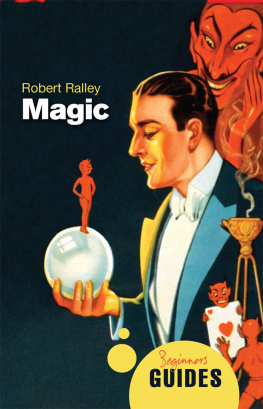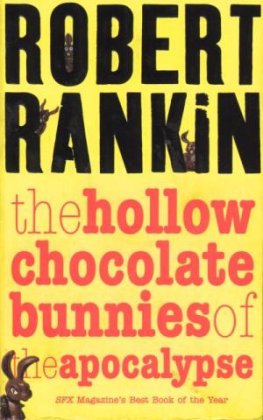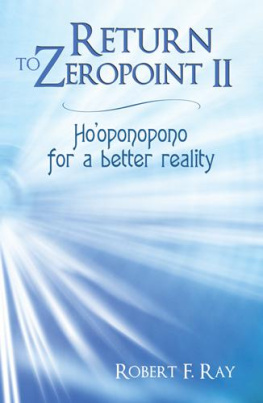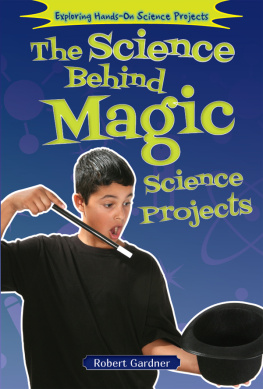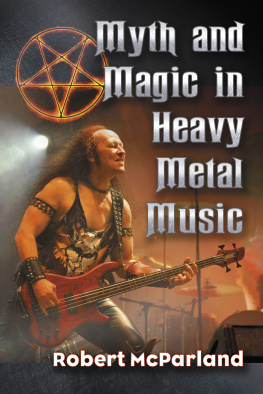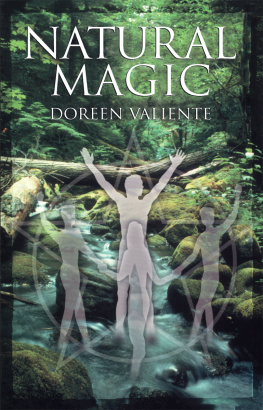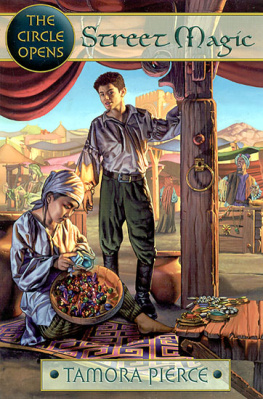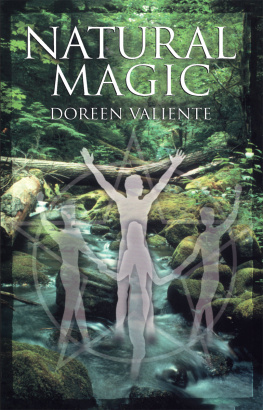Robert Ralley - Magic
Here you can read online Robert Ralley - Magic full text of the book (entire story) in english for free. Download pdf and epub, get meaning, cover and reviews about this ebook. publisher: Oneworld Publications, genre: Religion. Description of the work, (preface) as well as reviews are available. Best literature library LitArk.com created for fans of good reading and offers a wide selection of genres:
Romance novel
Science fiction
Adventure
Detective
Science
History
Home and family
Prose
Art
Politics
Computer
Non-fiction
Religion
Business
Children
Humor
Choose a favorite category and find really read worthwhile books. Enjoy immersion in the world of imagination, feel the emotions of the characters or learn something new for yourself, make an fascinating discovery.
- Book:Magic
- Author:
- Publisher:Oneworld Publications
- Genre:
- Rating:3 / 5
- Favourites:Add to favourites
- Your mark:
- 60
- 1
- 2
- 3
- 4
- 5
Magic: summary, description and annotation
We offer to read an annotation, description, summary or preface (depends on what the author of the book "Magic" wrote himself). If you haven't found the necessary information about the book — write in the comments, we will try to find it.
Magic — read online for free the complete book (whole text) full work
Below is the text of the book, divided by pages. System saving the place of the last page read, allows you to conveniently read the book "Magic" online for free, without having to search again every time where you left off. Put a bookmark, and you can go to the page where you finished reading at any time.
Font size:
Interval:
Bookmark:
A Beginners Guide
ONEWORLD BEGINNERS GUIDES combine an original, inventive, and engaging approach with expert analysis on subjects ranging from art and history to religion and politics, and everything in between. Innovative and affordable, books in the series are perfect for anyone curious about the way the world works and the big ideas of our time.
aesthetics
africa
anarchism
aquinas
art
artificial intelligence
the bahai faith
the beat generation
biodiversity
bioterror & biowarfare
the brain
british politics
the buddha
cancer
censorship
christianity
civil liberties
classical music
climate change
cloning
cold war
conservation
crimes against humanity
criminal psychology
critical thinking
daoism
democracy
descartes
dyslexia
energy
engineering
the enlightenment
epistemology
evolution
evolutionary psychology
existentialism
fair trade
feminism
forensic science
french revolution
genetics
global terrorism
hinduism
history of science
humanism
islamic philosophy
journalism
judaism
lacan
life in the universe
literary theory
machiavelli
mafia & organized crime
magic
marx
medieval philosophy
middle east
NATO
nietzsche
the northern ireland conflict
oil
opera
the palestineisraeli conflict
paul
philosophy of mind
philosophy of religion
philosophy of science
planet earth
postmodernism
psychology
quantum physics
the quran
racism
renaissance art
shakespeare
the small arms trade
the torah
sufism
volcanoes


A Oneworld Paperback Original
Published by Oneworld Publications 2010
This ebook edition published by Oneworld Publications 2012
Copyright Robert Ralley 2010
The moral right of Robert Ralley to be identified as the
Author of this work has been asserted by him in accordance with the
Copyright, Designs and Patents Act 1988
All rights reserved
Copyright under Berne Convention
A CIP record for this title is available from the British Library
ISBN 9781851687138
ebook ISBN 9781780741666
Typeset by Jayvee, Trivandrum, India
Cover design by vaguelymemorable.com
Oneworld Publications
10 Bloomsbury Street, London, WC1B 3SR, England
Stay up to date with the latest books, special offers, and exclusive content from Oneworld with our monthly newsletter
Sign up on our website
www.oneworld-publications.com
Thanks are due to several people: my editor, Marsha Filion, and an anonymous reader, both of whom provided invaluable criticism; Lauren Kassell and Sheila Nolan, for discussions and advice; and Jill Whitelock, to whom I owe a particular debt of gratitude for her indefatigable help and forbearance. None is responsible for any of the books remaining flaws.
Magic was an accusation long before it was a practice. Today we might associate it with deception and illusion, perhaps with charlatanry; unusual power, exercised in secret; we might think of spells and incantations, to gain advantage or cause damage. It is sometimes used to describe the beliefs of people from distant cultures. Many of the magic-related stereotypes we harbour are negative: witches and sorcerers are typically portrayed as evil. All of these notions can be traced directly back to the classical world. To the ancient Greeks, who coined the word, magic was an umbrella term for a number of fearsome and dangerous practices familiar from legend and myth: enchantment; sorcery; witchcraft; deception. These were connected by the suspicion that they were all pursuits of the mysterious Persian magi, the visitors from the east at the biblical nativity. Magic was what they thought the magi did. It was only later in antiquity that a small group of Greek philosophers depicted magic as a positive and worshipful activity. They opposed the widespread fear and condemnation, and embraced magic as genuine wisdom about the natural world.
Such disagreements are at the heart of the history of magic. No definition of magic, no interpretation or analysis of it, has ever been uncontroversial. Nor have the questions of what counts as magic and what does not, or who is practising magic and who is not. Magic, in short, is hard to pin down. All of which can cause problems for anyone trying to discuss it in broad terms. This book is guided by its subjects: it includes those who claimed to be practising magic and who advocated it; it includes accusations of magic (however unfounded) and the people who made them. It is a book about debates around magic, as much as it is about practices. What magic was, what it involved and who was doing it were questions that people wrangled over for centuries. In order to understand magic to appreciate where it came from, and how it comes to occupy its place in modern culture we need to pay close attention to the answers that they came up with. With that in mind, this introduction begins in the ancient world, exploring classical views of magic and the prejudices and beliefs that shaped them. These provided the foundations for all later discussions of magic. Magic, for these early writers, was intimately connected to the magi, so the next few pages also trace their changing portrayals by writers from ancient times through the Christian tradition to the modern period. These attitudes have shifted in parallel with the magical tradition, and clearly demonstrate the importance of ancient debates to the history of magic.
Before magic (Greek mageia, Latin magia) there were sorcerers, enchanters and witches. Sorcery (goeteia) seems to have been a well-established concept by the time Plato characterized it in the fourth century BC. In his account, sorcerers created illusions and cast spells to constrain the wills of unwitting subjects. Alongside the sorcerer stood the pharmakis (or venefica in Latin), perhaps best translated as witch. This was someone who used substances to harm people, either by administering them directly (as drugs or poisons) or at a distance (in a charm, for instance, perhaps accompanied by an incantation). Romans suspected witches of malicious acts such as moving neighbours grain to their own fields, or casting charms over neighbours fruit; these deeds were specified in the earliest law codes as punishable by execution. Later laws singled out for comment those who attempted anything against the life or person of anyone or who were found guilty of influencing chaste minds to lust. Soothsayers or prophets (harioli) were just as dangerous and should not be consulted. The law likewise forbade summoning the spirits of the dead or sacrificing to devils (daemones). By that time (the fourth or fifth centuries BC) any of these activities might be considered magical. Magic, for the Greeks and Romans, was about raising the dead and dealing with spirits; it involved deceiving and hurting people, by casting spells, using charms, administering poisons. Its practitioners might claim healing powers but they were not to be trusted. Perhaps the first clear description of magic as a field of activity was by Pliny the Elder (AD 2379); convinced of its utter falsity, Pliny described it as a seductive blend of medicine, religion and astrology. In short, magic was chiefly an accusation (not to say an insult): it was something one attributed to others.
Font size:
Interval:
Bookmark:
Similar books «Magic»
Look at similar books to Magic. We have selected literature similar in name and meaning in the hope of providing readers with more options to find new, interesting, not yet read works.
Discussion, reviews of the book Magic and just readers' own opinions. Leave your comments, write what you think about the work, its meaning or the main characters. Specify what exactly you liked and what you didn't like, and why you think so.

